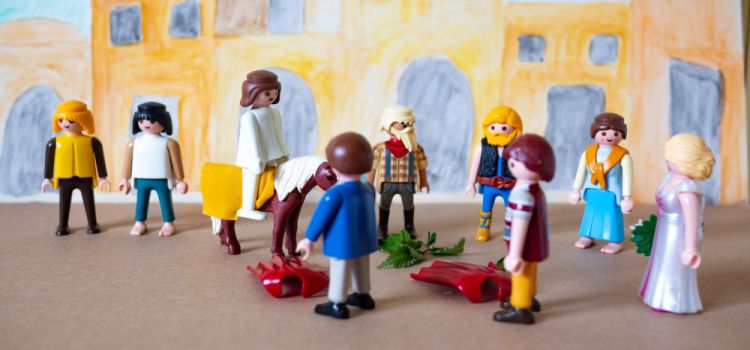
Hello everyone,
Welcome to the latest issue of our church newsletter for this year. Apologies that this issue is a little later arriving with you than usual – Covid finally caught up with me after managing to avoid it for two years and I thought it best to wait until I was testing negative again before sending the newsletter out! I hope you are all keeping well or recovering well if you’ve also been struck down with Covid. Our church is open for Sunday services but we will continue to live-stream our services and send out our newsletter regularly for the foreseeable future. Please note there will be no newsletter over the next week or so as I am taking a break over Easter. The next issue will be on 22 April.
You can find previous issues of the newsletter on our church website at www.christchurchuxbridge.org.uk We would love to hear from you and are looking for uplifting and encouraging content to share in future issues of this newsletter. If you have any ideas or content that we can share, please do email them to Louise (publicity@christchurchuxbridge.org.uk)
We start with our opening prayer:
Wonderful God,
thank you that you meet us
right here where we are sitting –
in the ordinary stuff and activities of this day.
As we journey through Holy Week,
may we recognise you in Christ Jesus,
be empowered to live like him –
to live into the preciousness of the life
that you sustain in us. Amen.
(Taken from Roots)
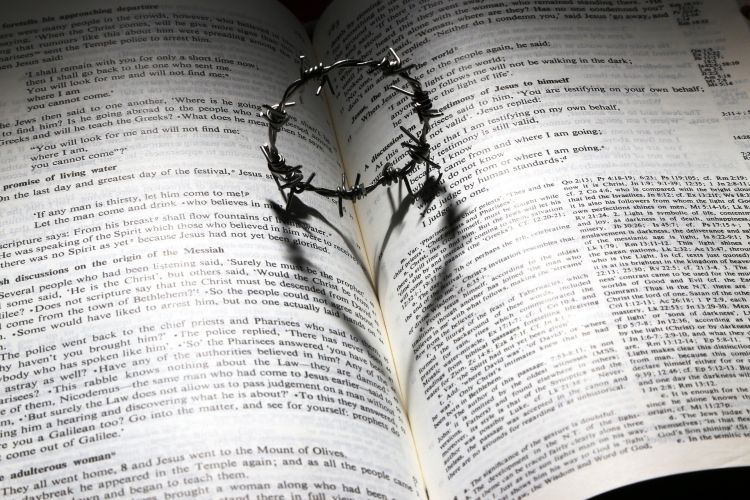
Reflection from 27 March: A man had two sons…
Readings: Luke 15:11-32 and 2 Corinthians 5:16-21
I am sorry. For Mothering Sunday there could not be a less appropriately gendered text. I suppose we could translate it, ‘A certain human being had two sons’ or even paraphrase, ‘someone had two children’. But if we do that, we would miss the impact that this might have had on those who heard Jesus speak. ‘A man had two sons’ as the introduction to a story would have had immediate resonance for Jesus’ Jewish audience. Often in their history, particularly their early history, the narrative was driven by a family drama, not infrequently between two sons.
‘A man had two sons’ and their names were Cain and Abel. They grew up with different professions until a time when both stood before God and Cain could not bear the fact that Abel enjoyed God’s favour in a way that he did not, so he murdered his brother and suffered God’s judgment because of it. ‘A man had two sons’ and envy, deceit and homicide appear in the world.
‘A man had two sons’ and their names were Ishmael and Isaac who played together until the jealousy of Isaac’s mother drove Ishmael and his mother away into the wilderness where they were rescued by God. Ishmael became the forebear of a nation which has periodically been at war with the descendants of Isaac ever since. ‘A man has two sons’ and international relations are marked by conflict.
‘A man had two sons’ and their names were Esau and Jacob who from the moment of their birth engaged in a tussle for supremacy. Or at least, one of them did, and found himself having to run away to establish a different life for himself until the point when his employer treated him so unjustly he fled back to his homeland and waited in fear for a moment of reunion with the man he had cheated. At least on that occasion generosity prevailed and reconciliation was accomplished, but it left two separate nations which had an uneasy relationship and in the time of Jesus an Herodian dynasty that claimed its descent from Esau ruling over the descendants of Jacob. ‘A man has two sons’ and interpersonal relationships are marked by deception and distrust.
‘A man had two sons’ and their names were Mahlon and Chilion. So the touching and subversive story of Ruth begins, the story that tells of the Moabite widow whose love and loyalty are proverbial and who became the ancestor of King David and the Jewish royal line. At last we have a woman in the frame, a foreign woman and Biblical scholars believe that the presence of the book of Ruth in the Hebrew Bible was deemed important as a counter to some who wanted to promote policies or narratives of racial purity. ‘A man had two sons’ and we need to be careful what we say about our own history.
‘A man had two sons’ – and there begin all the ills of the world and all the tensions with which we live.
‘A man had two sons’ says Jesus and his hearers are prepared for a tale of antagonism between siblings, and so it proves to be. Moreover, it is an unresolved tale of antagonism between siblings. This is a much more complicated story than its common title of ‘the Prodigal Son’ would suggest. We know the story well: the younger son makes an hurtful demand of his father, takes his share of the inheritance, goes to live the life of profligacy, ruins himself, and experiences poverty. He comes to his senses and returns home to receive a loving welcome and a fatherly embrace. The elder does his duty and is infuriated by the wastrel’s return, refusing to have any part in the pardon let alone the celebration his father has effected.
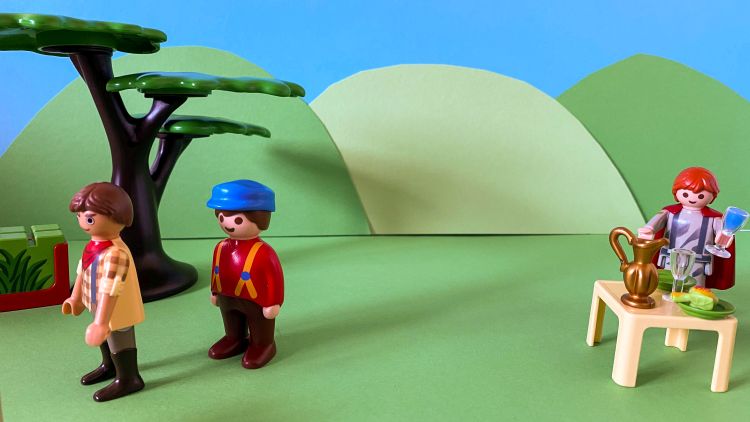
The parable ends outside the house; we can hear in the background the sound of music, dancing, laughter and feasting (reinforcing the elder son’s prejudice about his brother’s behaviour) as the father pleads with the son he loves. On this one the future of all that the father has achieved depends; he begs him to see things from a parent’s perspective and not to be intransigent. Why should the elder complain that he had not been given what the younger son now enjoyed? His riches were far, far greater. But we are left in suspense, never to learn what the elder son said next.
Later this week I have a meeting with some representatives of Israel. In all the complexity around our relationship as a Church with Judaism and with Israel, I’ve been helped in my thinking by the work of the late Chief Rabbi Jonathan Sacks. He wrote an important book ‘Not in God’s Name’ in which he traced the conflicts that exist between the followers of the three great Abrahamic faiths (Judaism, Christianity and Islam) to a fundamental human capacity for sibling rivalry. Too many of us grow up either resenting the attention a sibling gets or envying the sibling and wishing we were in her or his position. This mimetic desire (as psychologists call it) poisons our relationships – in our homes, in society, among nations, between religions. But we justify it in the narratives that we spin about ourselves and about the other. Mimetic desire plays itself out in a victim versus persecutor account that reinforces itself the more it is related. The elder son is typical – he has wasted your money on prostitutes (which might be right, but how does the elder know?); I have been treated like a slave (really?).
Such narratives can quickly harden. The tragedy that is unfolding in Ukraine is at one level about the policies of the current Russian government; but in Russia itself there will be those who offer a different narrative about a time when Ukraine and Russia were both part of a medieval kingdom ruled from Kyiv and of generations’ long tensions between Russian and Western values. It’s a typical attempt to reshape history in a conflict situation: I try to justify one position by framing the narrative my way and I tell, re-tell and exaggerate a story about another’s position to discredit them. It is the standard stuff of conflict. It is what happens in a failing marriage; it’s what happens in the run-up to an employment tribunal; it can be traced in the Nationalist against Unionist accounts in Northern Ireland and in myriad other intercommunal conflicts now and in the past. If there is to be any reconciliation between these opposing sides, I have to revisit my version of history and ask myself if the way that I tell the story is true. That is what the father in the parable does – he asks his son to reframe his narrative, to remember how privileged he is and to be sympathetic to what his father has suffered.
One of the most significant religious books of the last 30 years has been Miroslav Wolf’s Exclusion and Embrace. Volf wrote a theology of reconciliation partly out of his own experience as a Croatian who lived through the horrors of the wars in what we used to call Yugoslavia. In his work, Volf offers a picture of reconciliation through the metaphor of embrace. If you want to embrace someone, to show them love instead of hate, forgiveness instead of condemnation, acceptance instead of rejection, you need first to open your arms and wait; you make yourself vulnerable. You might be hurt, you might be rejected, or you might be embraced in return – but you take the risk and make the first move. However, you can’t do that, you can’t initiate the embrace, you can’t open your arms, as long as you believe a narrative that tells you that you are the victim or which suggests that the other is not deserving of love.
The elder son believes that his brother is not deserving of the love that has been shown to him; he also convinces himself that he has not been loved as he deserved. The father’s response is to try to defuse the mimetic desire, the resentment that the elder feels – he does not need to think that love for one son is in any way a refusal to love the other. The elder must know that he is loved by his father and be reconciled to his father before he can be reconciled to his brother.
‘God was in Christ reconciling the world to himself’, wrote Paul to the Corinthians. The gospel is that in Jesus the arms were open; we were told that we were loved; we were invited to be reconciled to God. Yet what happened? We saw the open arms and instead of rushing in that they might close around us, we pinned them back and nailed them to a piece of wood. Why? Perhaps it was because we do not like our narrative being challenged; we are threatened when we have to abandon our self-justifications; we resent a love that favours those who are not as we are. But God was not to be defeated and the love that longed to embrace us proved stronger than the hate that tried to kill it: the Risen Christ still opens his arms and still begs us to be reconciled to God, and if to God, then to be reconciled to each other. ‘God was in Christ reconciling the world to himself and has entrusted us with the ministry of reconciliation.’ Not only was God in Christ, we are now in Christ, which is a key phrase for Paul. His understanding of the Christian life was that it means being in Christ, part of a new creation. In that new creation we are free from the poisoned and resentful narrative of mimetic desire because we know that we are loved as we are, and that others are loved by God also, and we share God’s longing that all should know that love and also be free from the toxic stories that they tell themselves.
‘A man had two sons’ – and as we read the well-known parable we start to recognize that the father is the heavenly Father. Does God have two sons? The third chapter of Luke’s gospel is fascinating. Luke tells the story of the ministry of John the Baptist up to the point of his arrest; he then tracks back to tell of the baptism of Jesus; he then gives his version of Jesus’ genealogy (or family tree). The story of Jesus’ baptism (as you probably remember) ends with the voice from heaven: ‘You are my Son, the Beloved, with you I am well pleased.’ Then the genealogy begins with Jesus whom Luke describes as ‘the son, as people thought, of Joseph’ – but we have just been reminded that Jesus is the son of God. Luke goes back in history in the genealogy – through David, through Abraham, all the way back to Adam. Each name in the line is described as ‘son of…’ – David, son of Jesse…. Abraham, son of Terah…. Adam, son of God. We have two sons of God – Adam (who represents the whole human race) and Christ; in Paul’s language, the first Adam and the new Adam.
And we claim our place in Christ, the new Adam. The first Adam might stick to the narrative he has told himself – that he is not treated justly, that his brother or sister cannot be forgiven, that reconciliation is impossible except on the terms that he has contrived. The new Adam opens his arms and invites his brother to be embraced, with all his fears, with all his resentments, with all his unwillingness to forgive or to be forgiven, because those things can be sorted once he knows, really knows, how dearly loved he is.
Jesus leaves the story of the man with two sons unfinished – and that has to be the case. The last word comes from the father, and it is a plea. Accept that I love you, come into the house, be part of my work of reconciliation, remember that you are in Christ. The arms are open… and the next move is ours.
Rev’d Dr Jonathan Hustler
Reflection from 3 April
Readings: Isaiah 43:16-21 and John 12:1-8
Well, on this 5th Sunday of Lent all the recommended readings in the lectionary have a theme of being thankful to God for past blessings, but concentrating on the future. God’s provision for us, and more importantly, our response of praise and service.
We’ve just heard the reading from Isaiah, with the memory of the rescue of the Israelites from Egypt through a pathway through the sea and the drowning of the pursuing army. This must have really been something that they kept in their minds and talked about to their children and given thanks for, but the message of what we’ve just heard is forget the former things. Don’t dwell on the past. See, I am doing a new thing.
The epistle for today is from Philippians where Paul speaks about all the significant things of his past. He says he’s from the right tribe. He’s been through the right rituals. He’s been on the right denomination of the faith. He’s been an active persecution of people with a different faith. He’s kept the law perfectly, but he says he now that he knows Jesus, he forgets the past. It’s garbage, he says.
‘I press on to take hold of that for which Christ Jesus took hold of me… Forgetting what is behind and straining toward what is ahead.’ (Philippians 3:12,13)
So Jesus, up front and centre is the message. In a couple of weeks, we’ll be celebrating his conquering even of human death. Through him God cares for us now and in the future.
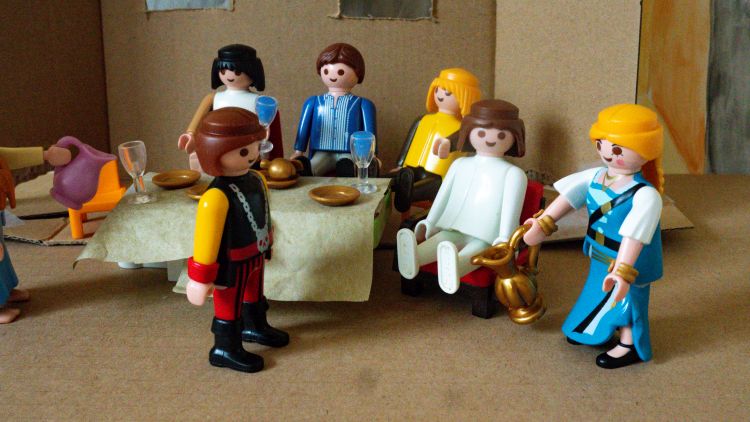
In our reading from John, Mary showed her love for Jesus by her generosity; by the way she lived and the way she gave so freely. She knew that Jesus deserved the best. How can each of us have in our church show our love for Jesus in generosity? By the way we live and the way we give.
My name is Mary. I’m the woman who got into trouble with my sister Martha from not helping out when Jesus came to visit us. My brother Lazarus is the man Jesus brought back to life. Jesus is our friend and has been so generous to us. I can’t put into words what Jesus’s love and care and power mean to me. It’s overwhelming.
So I had to do something generous in return to show how much I love him. I took some of the perfume I kept for the burial of my brother and poured it onto Jesus, his feet, and I wiped his feet with my hair. It was expensive perfume and so the fragrance fooled the whole room. Everyone could see what I’d done, but I wanted Jesus to receive the best that I could give.
Mary showed her love for Jesus by her generosity; how she lived and the way she gave. And the question for us is how can we do the same?
My name is Judas. I’m one of Jesus’s disciples. I couldn’t believe what I saw and smelt. Mary wasted a whole jar of expensive perfume. Not just a little, but the whole jar. But why? She says it was to show generous love to Jesus but what a waste. She could have sold the perfume and given the money to the poor. It was worth 300 silver coins, you know. That’s what I call generosity. I’m the keeper of the money bag so it would have helped me out too. Why does Jesus always turn things upside down?
So Judas objected to Mary’s generosity of her possessions, of her time and her love. The only thing that seems to matter to him is money. He mentioned the poor, but the information we given suggests that the money would have gone into the pot and who knows what it might have been used for? There’s even suggestion that some might find its way to him.
We, as individuals and as together as church, are blessed with gifts of possessions. Our church is well blessed with our buildings and all that we have here. We’re blessed with time and with money here too, for ourselves and for our church. Do you use these gifts wisely, generously and without hoarding?
Mary did the right thing. She showed her love and commitment to me by the way she lives and by the way she gives. What she did was a sign of extravagant love. Worship that comes from the heart and from a life lived for God. The poor will always be around. But Mary was pointing to the fact that I won’t be around for much longer. There will come a time when my dead body will be buried and it will need to be prepared. She doesn’t understand, but she will. Look at Mary as an example of how to live for me and to give for me. For the rest of history, she will be remembered for this. Look up Mary for an example of how to live for me and to give to me.
On another occasion, Mary sat with Jesus enthralled in his presence; listening to his every word, paying total attention to him and upset her sister by doing so. Jesus commended her then as he does here. We don’t have the opportunity of physically sitting with Jesus or showering him with expensive perfume. Our honouring of him has to be in our dedication to walking in his way, reading and following his words, learning from his example, carrying on his work among those around us.
Have you tried balancing a broom handle on your finger? If you keep your eyes on the broom head, you can move your hand about and still keep the thing upright. But the moment you take your eyes off the head, the broom falls.
I use that as an illustration of keeping your eyes on the right thing you know, and as because in that, as long as your eyes are on the broom head, then your hand goes where it needs to go in order to follow and be guided by what your eyes are on. So we should keep our eyes on Jesus. Keeping our eyes on him helps us to make the adjustments we need to in our lives as we follow him again, both as individuals or as a church together.
So in this Lent period that we’ve been through now when we learned so much of his teaching. We enjoy the times when the crowds are shouting his praises. We can’t imagine his suffering of being deserted by his friends and put through an agonizing death, but we know that shortly we’ll be rejoicing that all of that is overcome.
We don’t look back but go forward in his love and care and leading. May we worship him in our living with the generosity of sharing our possessions and our time and our service as Mary did.
Graham Hinton
Readings for 10 April
Luke 19:28-40 (NIV)
Jesus Comes to Jerusalem as King
28 After Jesus had said this, he went on ahead, going up to Jerusalem. 29 As he approached Bethphage and Bethany at the hill called the Mount of Olives, he sent two of his disciples, saying to them, 30 “Go to the village ahead of you, and as you enter it, you will find a colt tied there, which no one has ever ridden. Untie it and bring it here. 31 If anyone asks you, ‘Why are you untying it?’ say, ‘The Lord needs it.’”
32 Those who were sent ahead went and found it just as he had told them. 33 As they were untying the colt, its owners asked them, “Why are you untying the colt?”
34 They replied, “The Lord needs it.”
35 They brought it to Jesus, threw their cloaks on the colt and put Jesus on it. 36 As he went along, people spread their cloaks on the road.
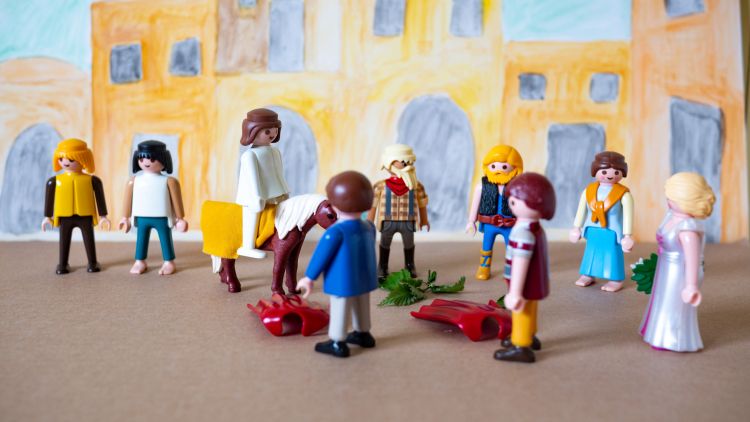
37 When he came near the place where the road goes down the Mount of Olives, the whole crowd of disciples began joyfully to praise God in loud voices for all the miracles they had seen:
38 “Blessed is the king who comes in the name of the Lord!”
“Peace in heaven and glory in the highest!”
39 Some of the Pharisees in the crowd said to Jesus, “Teacher, rebuke your disciples!”
40 “I tell you,” he replied, “if they keep quiet, the stones will cry out.”
Further readings from the lectionary this week are as follows:
- Psalm 118:1-2, 19-29
- Isaiah 50:4-9a
- Philippians 2:5-11
Readings for Holy Week
Monday 11 April
John 12:1-11
Isaiah 42:1-9
Psalm 36:5-11
Hebrews 9:11-15
Tuesday 12 April
John 12:20-36
Isaiah 49:1-7
Psalm 71:1-14
1 Corinthians 1:18-31
Wednesday 13 April
John 13:21-32
Isaiah 50:4-9a
Psalm 70
Hebrews 12:1-3
Thursday 14 April
John 13:1-17, 31b-35
Exodus 12:1-14
Psalm 116:1-2, 12-19
1 Corinthians 11:23-26
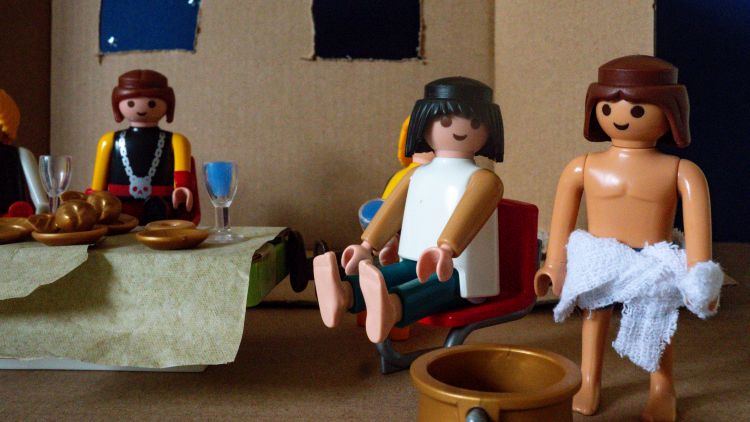
Friday 15 April
John 18:1 – 19:42
Isaiah 52:13 – 53:12
Psalm 22
Hebrews 10:16-25
Saturday 16 April
Matthew 27:57-66
Job 14:1-14
Psalm 31:1-4, 15-16
1 Peter 4:1-8
Readings for 17 April
John 20:1-18 (NIV)
The Empty Tomb
Early on the first day of the week, while it was still dark, Mary Magdalene went to the tomb and saw that the stone had been removed from the entrance. 2 So she came running to Simon Peter and the other disciple, the one Jesus loved, and said, “They have taken the Lord out of the tomb, and we don’t know where they have put him!”
3 So Peter and the other disciple started for the tomb. 4 Both were running, but the other disciple outran Peter and reached the tomb first. 5 He bent over and looked in at the strips of linen lying there but did not go in. 6 Then Simon Peter came along behind him and went straight into the tomb. He saw the strips of linen lying there, 7 as well as the cloth that had been wrapped around Jesus’ head. The cloth was still lying in its place, separate from the linen. 8 Finally the other disciple, who had reached the tomb first, also went inside. He saw and believed. 9 (They still did not understand from Scripture that Jesus had to rise from the dead.) 10 Then the disciples went back to where they were staying.
Jesus Appears to Mary Magdalene
11 Now Mary stood outside the tomb crying. As she wept, she bent over to look into the tomb 12 and saw two angels in white, seated where Jesus’ body had been, one at the head and the other at the foot.
13 They asked her, “Woman, why are you crying?”
“They have taken my Lord away,” she said, “and I don’t know where they have put him.” 14 At this, she turned around and saw Jesus standing there, but she did not realize that it was Jesus.
15 He asked her, “Woman, why are you crying? Who is it you are looking for?”
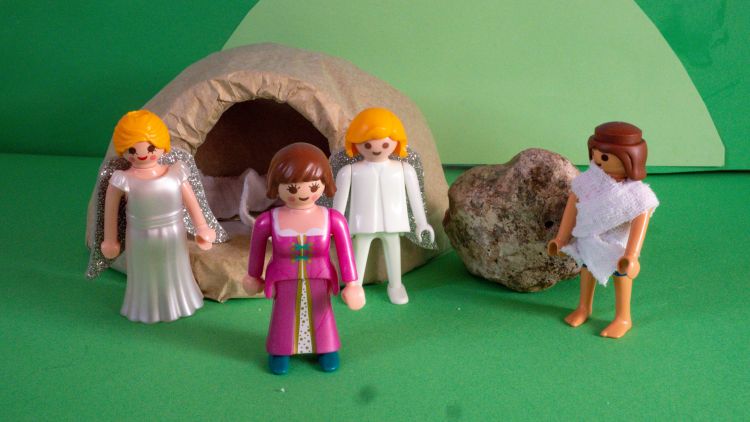
Thinking he was the gardener, she said, “Sir, if you have carried him away, tell me where you have put him, and I will get him.”
16 Jesus said to her, “Mary.”
She turned toward him and cried out in Aramaic, “Rabboni!” (which means “Teacher”).
17 Jesus said, “Do not hold on to me, for I have not yet ascended to the Father. Go instead to my brothers and tell them, ‘I am ascending to my Father and your Father, to my God and your God.’”
18 Mary Magdalene went to the disciples with the news: “I have seen the Lord!” And she told them that he had said these things to her.
Further readings from the lectionary this week are as follows:
- Acts 10:34-43
- Psalm 118:1-2, 14-24
- 1 Corinthians 15:19-26
Our worship
We meet at 11am for our Sunday services, which are also live-streamed on our Facebook page. If you wish to view our services online, you can find them at www.facebook.com/christchurchuxbridge. You do not have to be a Facebook user to watch them – our services are publicly viewable. You can also view a recent service on our church website. Our Palm Sunday service will be led by Methodist local preacher, Cathy Smith. You can find the order of service here.
If you are unable to join us in person or online for our Sunday services, but would like to receive a recording of them on a memory stick to watch at home, please let us know.
Forthcoming services
10 April – Mrs Cathy Smith (Methodist local preacher) – Palm Sunday
14 April – Christ Church worship group – Maundy Thursday, 7pm
17 April – Rev’d John Mackerness – Easter Sunday communion service
24 April – Mr George Kulasingham (Methodist local preacher)
1 May – Christ Church worship group
8 May – Mr Graham Hinton (URC lay preacher and Christ Church member)
Lent Course – Growing Good
The ‘Growing Good’ course helps churches explore the connection between social action, discipleship and growth. Through reflection, discussion, film and prayer we will explore how our churches can be faithful and fruitful in our local communities.
Our Lent course is held in the chapel on Saturday mornings, 10am – 11.15am until 9 April and will be followed by the weekly time of prayer. All are welcome.
Maundy Thursday Service
Our Maundy Thursday service will take place on Thursday 14 April at 7pm in the chapel. As part of our service, we will share a simple supper of soup and bread, followed by sharing communion together. All are welcome.
You do not need to let us know in advance if you are planning on attending this service, but if you are able to do so it would be helpful with regards to catering arrangements.
Good Friday Walk of Witness
Churches Together in Uxbridge invite all church members to participate in this year’s Walk of Witness, which is on Good Friday 15th April at 11am, starting at the Church of Our Lady of Lourdes (round the back of the Pavilions Shopping Centre), making its way through the town centre and finishing at St Margaret’s Church.
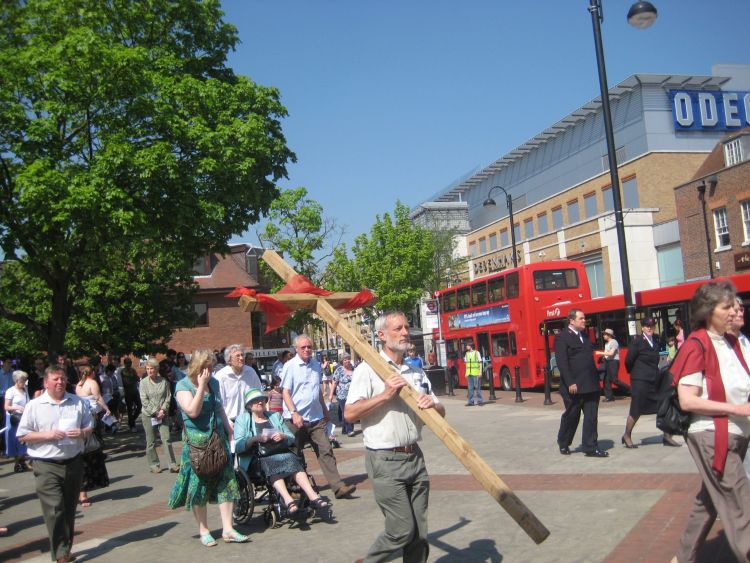
Appeal for Stewards
The Walk of Witness will run more safely and smoothly with the assistance of volunteer stewards. We are looking for a couple from each church. Please let Louise know if you are prepared to be a steward. You will receive a briefing by email, reinforced on the day at 10:45, as walkers gather at Our Lady of Lourdes.
(To anyone interested, stewards will:
- wear a hi-vis tabard – provided on the day;
- encourage walkers along the route to follow general instructions given to all;
- assist the crossing over to the War/Peace Memorial at the bottom of Windsor St;
- take no risks which an ordinary pedestrian would avoid.)
Church charity news
Family film afternoon – Saturday 9th April, 1pm
We will be having another family film afternoon on Saturday 9th April at 1pm. There will be popcorn and other refreshments available. There is no charge to attend the film afternoon but if you would like to make a donation to Halo Children’s Foundation, you can do so online or through our collection on the day.
Easter crafts morning – Saturday 16th April, 10am – 12noon
Join us for a morning of Easter crafts in aid of our church charity. All are welcome.
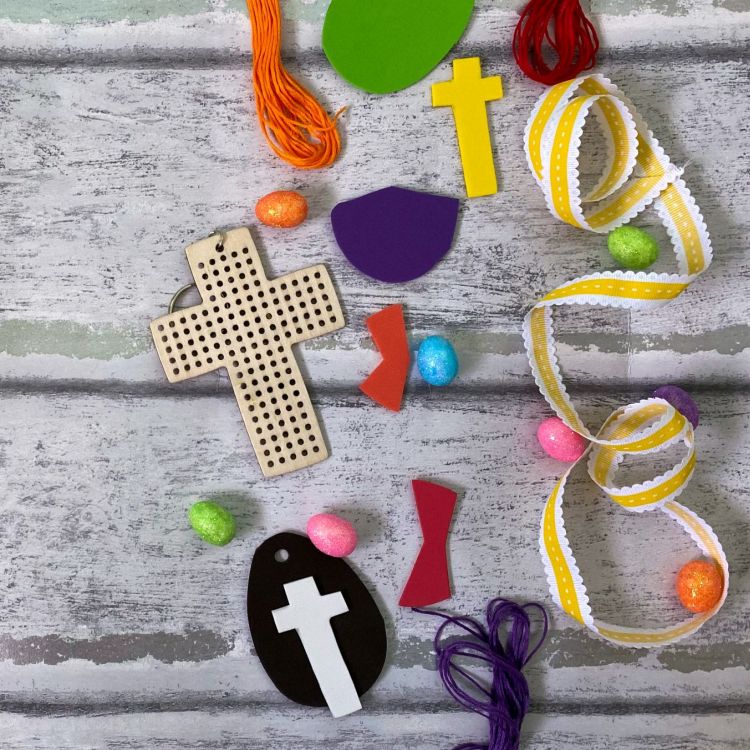
Walking for Halo – an update from Jean Wilson-Main
In February, a rush of blood to some parts of my brain that, presumably, don’t receive any usually, caused me to decide to walk 200 miles in March to raise money for HALO. I achieved this despite getting Covid the final week.
So far I have raised £300 from on line and cash donations. Thank you to everyone for the donations and for the messages of encouragement. The last few miles were a strain to do. One day I walked the River Pinn walk, and met half of Ickenham, when I usually see hardly anyone. I successfully avoided people, kids and dogs, with the exception of one small red coloured dog that ran to me with shouts of joy while I backed away muttering—no, no, and wondering if you could give dogs Covid.
The final bit I did in the back garden accompanied by my three cats who looked at me as if they had decided that they were after all, correct, their pet human was, in fact, crazy.
Anyhow, I finished on time on March 31st, which was a great relief. Thank you again to all who supported me and the charity.
You can find more details about HALO Children’s Foundation, our church charity for 2022 at:
www.christchurchuxbridge.org.uk/activities/churchcharity2022/
To make a donation to our church charity online visit www.justgiving.com/fundraising/christ-church-halo2022
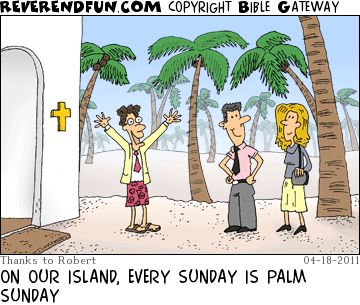
I Say, I Say, I Say!
Louise will be performing in ‘I Say, I Say, I Say! A Tribute to Old Time Music Hall’ with WOS Productions at St Lawrence Church Hall, Eastcote, at the end of May.
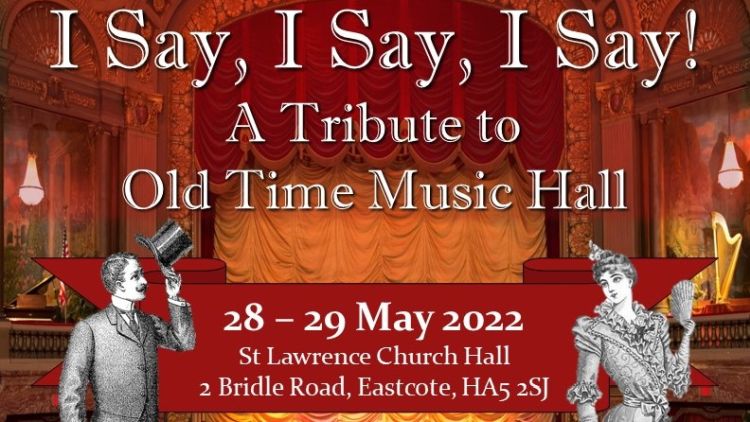
Join the ‘Wospian Players’ as we bring the glory of traditional Victorian and Edwardian music hall to Hillingdon in full authentic period costume. With singing, dancing and melodrama from our intrepid band of players, and a vivacious and verbose Chairman leading the proceedings, we can guarantee a fabulously entertaining outing with plenty of singalong opportunities! Come to just the show or enjoy traditional pie and mash before we start the performance.
Tickets are available via the WOS Productions website (www.wos-productions.org.uk) at £15 for adults, £10 for children (12 and under) and £10 for an additional dining and drink ticket. There are three performances as follows:
Saturday 28 May: 15:30 (15:00 dining start)
Saturday 28 May: 19:30 (19:00 dining start)
Sunday 29 May: 15:30 (15:00 dining start)
Children’s Corner
Can you find the key words from the Bible reading for Palm Sunday?
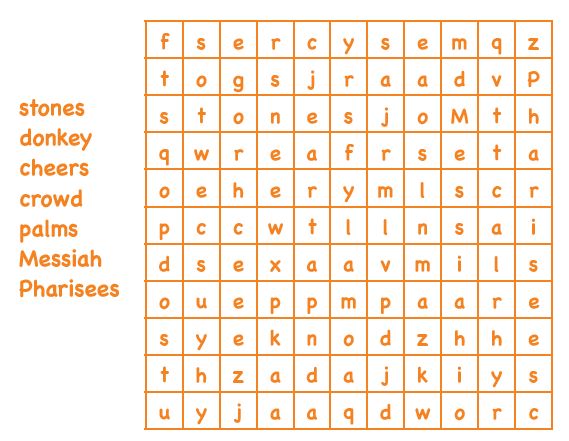
Praying for other churches
w/c 10 April
This week we hold the following churches in our prayers:
- South Harrow Methodist
- St Margaret’s & St George’s, Harlesden (URC/Moravian)
w/c 17 April
This week we hold the following churches in our prayers:
- Trinity (URC/Methodist)
Closing prayer
May God grant you
exuberance of the Palm Sunday crowd,
and the humility of Jesus riding a donkey;
the energy and excitement of the crowd,
and the calm holiness of Jesus;
the expectation of the crowd,
and the understanding heart of Jesus
who journeyed to Jerusalem for love of us all. Amen.
(Taken from Roots)
